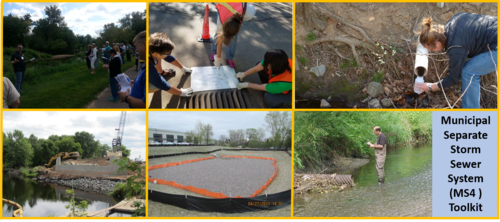
Difference between revisions of "Category:Level 2 - Regulatory/Municipal (MS4)"
m |
m |
||
| Line 13: | Line 13: | ||
Proper stormwater runoff management in urbanized areas is especially important for restoring and protecting surface waters. Urbanized areas are more likely to have activities that contribute pollutants to stormwater runoff, like applying anti/deicing mixtures to roads; fueling vehicles; grease, oil, and other spills; landscaping; and using pesticides and fertilizers. Urbanized areas have a large amount of impervious surfaces, or surfaces that rain and snowmelt cannot pass through, such as streets, driveways, rooftops, parking lots and sidewalks. Stormwater runoff from these surfaces travels faster and in higher amounts, damaging rivers, streams, and wetlands; destroying aquatic habitats; increasing the amount of pollutants that enter surface waters; and limiting groundwater recharge. | Proper stormwater runoff management in urbanized areas is especially important for restoring and protecting surface waters. Urbanized areas are more likely to have activities that contribute pollutants to stormwater runoff, like applying anti/deicing mixtures to roads; fueling vehicles; grease, oil, and other spills; landscaping; and using pesticides and fertilizers. Urbanized areas have a large amount of impervious surfaces, or surfaces that rain and snowmelt cannot pass through, such as streets, driveways, rooftops, parking lots and sidewalks. Stormwater runoff from these surfaces travels faster and in higher amounts, damaging rivers, streams, and wetlands; destroying aquatic habitats; increasing the amount of pollutants that enter surface waters; and limiting groundwater recharge. | ||
| − | This page links to pages, subcategories, and other information on municipal stormwater. | + | This page links to pages, subcategories, and other information on municipal stormwater, particularly as related to the MS4 permit and municipal stormwater regulations. |
[[Category:Level 1 - Regulatory]] | [[Category:Level 1 - Regulatory]] | ||
Revision as of 13:20, 9 February 2023
The municipal separate storm sewer system (MS4) stormwater program is designed to reduce the amount of sediment and pollution that enters surface and ground water from storm sewer systems. Public entities that own or operate an MS4 play a key role in preventing or reducing the negative impacts stormwater runoff has on our valuable water resources.
Proper stormwater runoff management in urbanized areas is especially important for restoring and protecting surface waters. Urbanized areas are more likely to have activities that contribute pollutants to stormwater runoff, like applying anti/deicing mixtures to roads; fueling vehicles; grease, oil, and other spills; landscaping; and using pesticides and fertilizers. Urbanized areas have a large amount of impervious surfaces, or surfaces that rain and snowmelt cannot pass through, such as streets, driveways, rooftops, parking lots and sidewalks. Stormwater runoff from these surfaces travels faster and in higher amounts, damaging rivers, streams, and wetlands; destroying aquatic habitats; increasing the amount of pollutants that enter surface waters; and limiting groundwater recharge.
This page links to pages, subcategories, and other information on municipal stormwater, particularly as related to the MS4 permit and municipal stormwater regulations.
Subcategories
This category has the following 5 subcategories, out of 5 total.
L
- Level 3 - General information, reference, tables, images, and archives/Images/Municipal stormwater (MS4) photos
- Level 3 - Regulatory/Municipal (MS4)/Fact sheet
- Level 3 - Regulatory/Municipal (MS4)/Guidance, outreach materials, miscellaneous information
- Level 3 - Regulatory/Municipal (MS4)/Phase 1
- Level 3 - Regulatory/Municipal (MS4)/TMDLs
Pages in category "Level 2 - Regulatory/Municipal (MS4)"
The following 68 pages are in this category, out of 68 total.
2
- 2013 MS4 General Permit
- 2017 MS4 Technical Assistance and Outreach Needs Survey Results
- 2020 MS4 General Permit
- 2020 MS4 General Permit Appendix A: Alum or Ferric Chloride Phosphorus Treatment Systems
- 2020 MS4 General Permit Appendix B: Schedules
- 2020 MS4 General Permit Section 1 Eligibility
- 2020 MS4 General Permit Section 10 New Permittee Applicants
- 2020 MS4 General Permit Section 11 Existing Permittee Applicants
- 2020 MS4 General Permit Section 12 Stormwater Pollution Prevention Program (SWPPP) Document
- 2020 MS4 General Permit Section 13 Stormwater Pollution Prevention Program (SWPPP)
- 2020 MS4 General Permit Section 14 Mapping
- 2020 MS4 General Permit Section 15 Minimum Control Measures (MCMs)
- 2020 MS4 General Permit Section 16 MCM 1: Public Education and Outreach
- 2020 MS4 General Permit Section 17 MCM 2: Public Participation/Involvement
- 2020 MS4 General Permit Section 18 MCM 3: Illicit Discharge Detection and Elimination
- 2020 MS4 General Permit Section 19 MCM 4: Construction Site Stormwater Runoff Control
- 2020 MS4 General Permit Section 2 Authorized Stormwater Discharges
- 2020 MS4 General Permit Section 20 MCM 5: Post-Construction Stormwater Management
- 2020 MS4 General Permit Section 21 MCM 6: Pollution Prevention/Good Housekeeping For Municipal Operations
- 2020 MS4 General Permit Section 22 Discharges to Impaired Waters with a USEPA-Approved TMDL that includes an Applicable WLA
- 2020 MS4 General Permit Section 23 Alum or Ferric Chloride Phosphorus Treatment Systems
- 2020 MS4 General Permit Section 24 Stormwater Pollution Prevention Program (SWPPP) Modification
- 2020 MS4 General Permit Section 25 Annual Assessment, Annual Reporting, and Recordkeeping
- 2020 MS4 General Permit Section 26 General Conditions
- 2020 MS4 General Permit Section 27 Definitions
- 2020 MS4 General Permit Section 3 Authorized Non-Stormwater Discharges
- 2020 MS4 General Permit Section 4 Limitations on Authorization
- 2020 MS4 General Permit Section 5 Permit Authorization
- 2020 MS4 General Permit Section 6 Transfer of Ownership or Control
- 2020 MS4 General Permit Section 7 Issuance of Individual Permits
- 2020 MS4 General Permit Section 8 Rights and Responsibilities
- 2020 MS4 General Permit Section 9 Application for Reissuance
- 2020 MS4 General Permit TMDL Application
C
E
F
M
P
S
Media in category "Level 2 - Regulatory/Municipal (MS4)"
The following 3 files are in this category, out of 3 total.
